| Srl | Item |
| 1 |
ID:
078559


|
|
|
|
|
| Publication |
2007.
|
| Summary/Abstract |
ABSTRACT. This article seeks to bring to the fore the intrinsic link between constitutional democracy and the civic nation, relying on Jürgen Habermas's theory of democracy. This theoretical framework will serve as the basis for a communicative understanding of civic nationalism, underscoring the notable role played by language. Attention will be given to the normative dimension that allows for the legitimisation of national divisions of a civic space bound by universal rights. The prime motivation behind this article is thus political-philosophical, although empirical examples, drawn particularly from the French revolutionary discourse, will be brought to bear. And since a civic nation construed in communicative terms has necessary linguistic implications, cases of multilingual and multinational states will be examined
|
|
|
|
|
|
|
|
|
|
|
|
|
|
|
|
| 2 |
ID:
078564


|
|
|
|
|
| Publication |
2007.
|
| Summary/Abstract |
Both Will Kymlicka (1995) and David Miller (1995) have defended the value of national self-determination and have argued that a properly organised self-determining nation respects rather than undermines the equal treatment of all of its members, including ethnic, religious and cultural minorities. I argue that their respective attempts to defend national self-determination and the equal treatment of all members of the nation are saddled with a serious tension. It is actually quite difficult to coherently argue both that (a) national self-determination fulfils ethically valuable ends, and that (b) a self-determining nation can treat all members equally. The equality-respecting requirement is in tension with the claim that nations secure ethically valuable goods for their members
|
|
|
|
|
|
|
|
|
|
|
|
|
|
|
|
| 3 |
ID:
078558
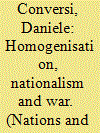

|
|
|
|
|
| Publication |
2007.
|
| Summary/Abstract |
Is homogenising nationalism a consequence of industrialisation? This view has been most forcefully and systematically advanced by Ernest Gellner. The article contests this approach by focusing instead on militarism and militarisation. It therefore identifies the key role of the mass army as presaging the era of mass nationalism and cultural homogenisation. Drawing on a range of authors from history, sociology and political science, the relationship is found to be reciprocal and symbiotic. A preliminary exploration on the possibility of early modern (or pre-modern) forms of cultural homogenisation is preceded by a critical assessment of Gellner's interchangeable use of the terms culture, language and ethnicity.
|
|
|
|
|
|
|
|
|
|
|
|
|
|
|
|
| 4 |
ID:
078561
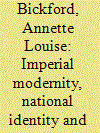

|
|
|
|
|
| Publication |
2007.
|
| Summary/Abstract |
This article draws upon the fascinating and little known 1931 Samarcand Arson Case involving the possible execution of adolescent white female inmates at a juvenile reformatory in North Carolina. Marked by nationalist discourses, the spectacle generated by this case indicates much about how white New South advocates construed national life and sought to construct a white 'civilised' collective identity, defending their region from Northern charges of Southern barbarism and asserting their place within the imperial politics of American nation building. The decision not to execute any of the sixteen defendants was informed by a series of interconnected ideas about sexuality, national danger, 'civilisation' and 'race,' suggesting that the presumed 'legal chivalry' extended to the young defendants was not a simple matter of gender bias, but involved a nuanced set of reasons related to negotiations of national belonging through racialised alliances
|
|
|
|
|
|
|
|
|
|
|
|
|
|
|
|
| 5 |
ID:
078563
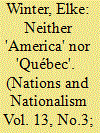

|
|
|
|
|
| Publication |
2007.
|
| Summary/Abstract |
Although researchers have deconstructed the myth of stark social differences between the various North American sub-societies, an assimilating American melting pot and an ethnically oppressive monocultural Québec are still popular representations within Canadian majority discourses, such as the English-language mainstream media and parts of academia. In this paper, I argue that images of 'America' and 'Québec' play important roles for the multicultural reconstruction of Canadian nationhood. Examining selected op-ed articles from two Toronto-based mainstream newspapers during the 1990s, I develop and exemplify a theoretical understanding of how national identities are constituted and transformed within inter- and intra-national relations of power and alterity. I pay special attention to the particularisation of Canada through the confrontation with American nationhood, the ambiguities of recognising the distinctiveness of Québec inside Canada, and the consequences of projecting Québec's supposedly 'ethnic' nationalism outside the boundaries of Canadianness
|
|
|
|
|
|
|
|
|
|
|
|
|
|
|
|
| 6 |
ID:
078560
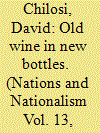

|
|
|
|
|
| Publication |
2007.
|
| Summary/Abstract |
equates nationalism with 'the organisation of human groups into large, centrally educated, culturally homogeneous units'. As the theorist of nationalism argues, and as recent and not so recent historical research shows, the modernisation of schooling is a defining moment in this process. The objective of this article is twofold: first, to show that during the Risorgimento schooling in Piedmont became nationalist; and second, to explain why that was the case. In doing so, it is argued that: (a) the modernisation of schooling reflected the rise of laissez faire liberalism, industrialisation and the enfranchisement of the middle class; and (b) the leadership of the Risorgimento revived pre-modern ethnic symbols of patriotism to legitimate inequality and state formation under conditions of individualism.
|
|
|
|
|
|
|
|
|
|
|
|
|
|
|
|
| 7 |
ID:
078562
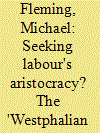

|
|
|
|
|
| Publication |
2007.
|
| Summary/Abstract |
In the immediate aftermath of World War II the Polish state placed a high value on national homogeneity. The Polish Committee of National Liberation signed population exchange agreements with its socialist neighbours in September 1944 and expelled the German population who remained within the new Polish borders. Far less frequently discussed are the Polish state's efforts to persuade 'Poles' in Western Europe to move to Poland. This paper analyses how Polish policy towards 'Westphalian Poles' and the British reaction to Polish claims offer insight into both Polish and British nationality and citizenship policy in the immediate post-war period. I argue that the quality of potential labour played an important role in both British and Polish thinking. The paper also contends that the 'Westphalian incident' gives useful insights into the emergence of the Cold War
|
|
|
|
|
|
|
|
|
|
|
|
|
|
|
|